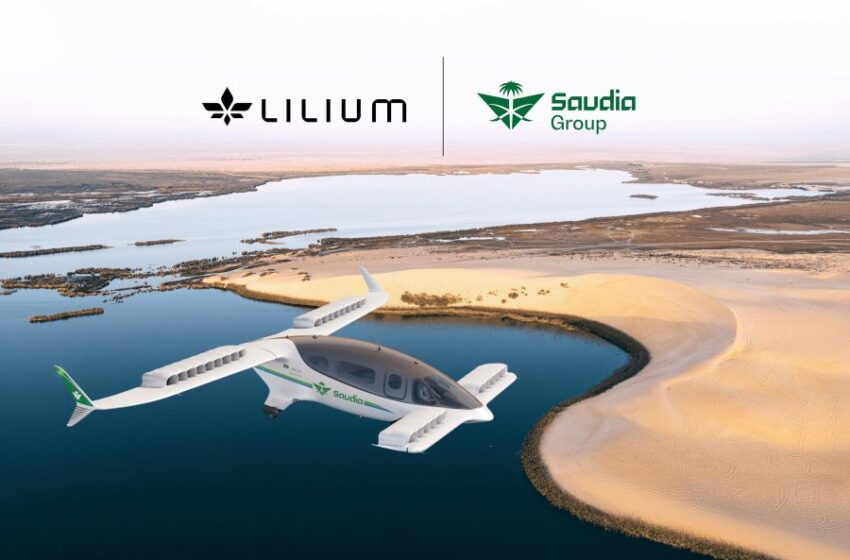
Saudia Group to Buy 50 eVTOL Jets from Lilium
Saudi Arabia’s Saudia Group and German’s Lilium N.V. a leading electric vertical take-off and landing (eVTOL) aircraft manufacturer and pioneer in Regional Air Mobility (RAM), on Thursday signed an agreement for 50 Lilium Jets, with options for the purchase of 50 more.
Saudia Group expects to receive the first jets in 2026, for which operations will be managed and run by Saudia Private, a subsidiary of Saudia Group. The Lilium Jet will feature large, premium cabins with capacity for up to six passengers plus luggage.
The signature ceremony was held at Lilium’s HQ in Gauting near Munich and the agreement was signed by Fahd Al-Jarbou, CEO of Saudia Private, and Lilium’s CEO Klaus Roewe. Several dignitaries including Michael Kindsgrab, the German Ambassador to Saudi Arabia, Ibrahim Al-Omar, Director General of Saudia Group, and Lilium Chairman Tom Enders.
This agreement is follow-up of the Memorandum of Understanding (MOU) between Saudia Group and Lilium signed in October 2022, and marks the largest of its kind in the MENA region and represents an important industry milestone as the largest reported firm order of eVTOL aircraft by an airline that plans to operate the aircraft.
The agreement includes a schedule of deposit and pre-delivery payments, timeline of future deliveries, guarantees on aircraft performance, and provisions on spare parts, maintenance, and repairs. In addition, the parties intend to sign a comprehensive “Lilium POWER-ON” agreement for aircraft fleet maintenance and support services.
First in MENA
Ibrahim Al-Omar said that Saudia Group is leading the MENA region as the first company to acquire all-electric eVTOL jets, which reflects the Group’s commitment to continuously reducing carbon footprint and becoming an industry leader in regional electric aviation.
“We recognise the critical role that Lilium is positioned to play in enabling us to deliver a sustainable premium aviation experience and transport our guests even closer to their destination. This agreement amplifies our commitment to the Saudi Vision 2030 and is the result of a collaborative effort over the past years between Lilium and Saudia Group to explore how we can best bring eVTOL to the skies of Saudi Arabia,” he said.
According to him, the eVTOL jets have been revolutionising guest transportation as their unique vertical take-off and landing capabilities open up entirely new routes. Traveling up to 175 km at speeds of 250 km per hour, will save valuable time compared to traditional options.
“This technology also tackles traffic congestion head-on. Business travellers and exhibition attendees will benefit tremendously from the ease and speed of electric aircraft, allowing them to seamlessly attend and participate in events. These innovative vehicles will also be a game-changer for tourism, sports, and entertainment, offering a premium travel experience for these exciting destinations,” he added.
Through this agreement, Saudia Group continues its ambitious objective to bring the world to the Kingdom by deploying its fleet of advanced eVTOL jets.
This initiative enhances connectivity by providing seamless first and last leg connections into Saudia Group’s regional hubs and new point-to-point city connections, such as Jeddah to Makkah, expected to reduce regional travel times by up to 90%.
These jets will support Hajj and Umrah pilgrimages, offer faster access to key sports and entertainment events in Riyadh, and unlock new possibilities for exploring hard-to-reach tourist destinations across the Kingdom.
Lililum CEO Klaus Roewe said that they were thrilled to be pioneering progress in the eVTOL industry as the eVTOL manufacturer with the largest reported firm purchase order from an international airline that plans to operate the aircraft.
“The Middle East is a priority for Lilium, and Saudi Arabia will be a very large and exciting market for electric, high-speed regional air mobility. Our partnership will combine Saudia Group’s significant market knowledge with our unique eVTOL technology to transform premium class air travel in the GCC region,” he added.















